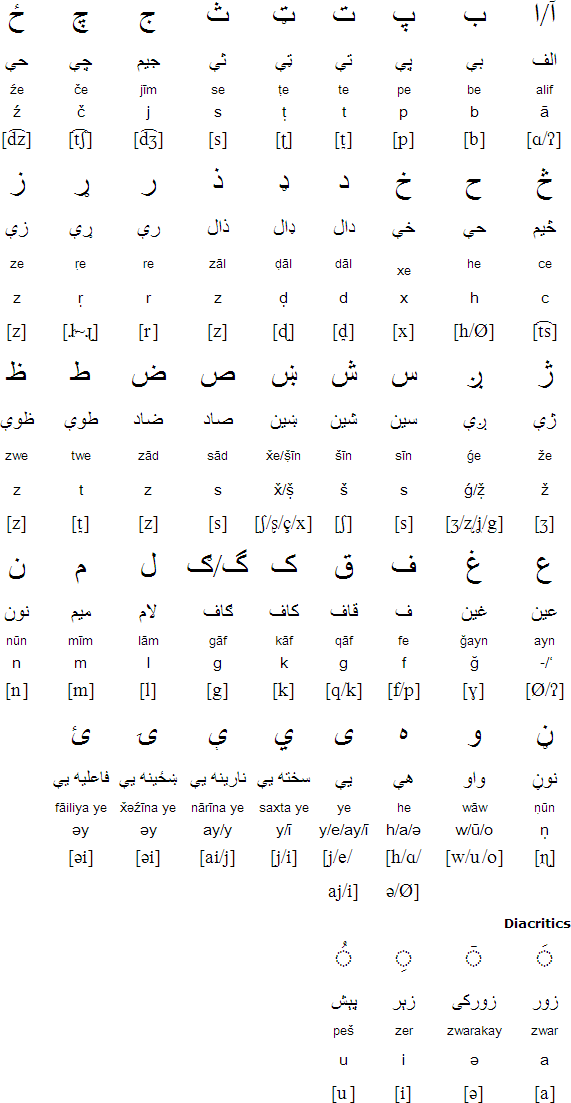Pashto is a member of the southeastern Iranian branch of Indo-Iranian languages spoken in Afghanistan, Pakistan and Iran. There are three main varieties of Pashto: Northern Pashto, spoken mainly in Pakistan; Southern Pashto, spoken mainly in Afghanistan; and Central Pashto, spoken mainly in Pakistan.
The exact number of Pashto speakers is not known for sure, but most estimates range from 45 million to 55 million. Pashto is the first language of between 40% and 55% (11 to 15.4 million) of the people of Afghanistan, and 10% to 28% (2.8 to 7.8 million) speak it as a second language, and the total is around 18 or 19 million.
Pashto has about 25 million speakers in Pakistan (15% of the population) in the Federally Administered Tribal Areas (FATA), and the provinces of Balochistan, Mianwali, Attock, Sindh, Punjab and Khyber Pakhtunkhwa.
There are also communities of Pashto speakers in the northeast of Iran, Tajikistan and India, as well as in the UAE, Saudi Arabia and a number of other countries.
Pashto was made the national language of Afghanistan by royal decree in 1936. Since then, the Pashto spelling system has been revised to some extent. Today both Dari and Pashto are official languages there.
Pashto first appeared in writing during the 16th century in the form of an account of Shekh Mali's conquest of Swat. It is written with a version of the Arabic script. There are two standard written forms: one based on the dialect of Kandahar, the other on the dialect of Peshawar.
The name Pashto is thought to derive from the reconstructed proto-Iranian form, parsawā 'Persian language. In northen Afghanistan speakers of Pashto are called Pakhtūn; in sourthen Afghanistan they are known as Pashtūn, and as Pathān or Afghan in Pakistan.

Notes and some details of Pashto pronunciation provided by Michael Peter Füstumum


Də bašar ṫol afrād āzād naṙəy tâ rāźī au də ḥays̱iyat au ḥuqūqo lâ palwâ sarâ barābar dī. ṫol də ʿaqəl au wijdān ḫāwandān dī au yo lâ bal sarâ də warorəy pâ rūḥiye sarâ bāyad čaland kəṙī.
Hear a recording of this text (made with Text To Speech Free)
All human beings are born free and equal in dignity and rights. They are
endowed with reason and conscience and should act towards one another in a
spirit of brotherhood.
(Article 1 of the Universal Declaration of Human Rights)
Information about Pashto | Phrases | Numbers | Tower of Babel | Learing materials
Information about the Pashto language
https://en.wikipedia.org/wiki/Pashto
https://iranian-languages.arizona.edu/node/4
https://www.mustgo.com/worldlanguages/pashto/
Online Pashto lessons
http://polymath.org/pashtu.php
http://ilanguages.org/pashto.php
https://www.ilovelanguages.org/pashto.php
https://utalk.com/en/store/pashto
Pashto phrases
https://ilovelanguages.org/pashto_phrases.php
https://www.masteranylanguage.com/c/p/o/Pashto
http://wikitravel.org/en/Pashto_phrasebook
Online Pashto dictionaries
https://www.thepashto.com/
http://www.pashtoenglish.org/
http://dsal.uchicago.edu/dictionaries/raverty/
http://www.qamosona.com
Pashto fonts
http://www.wazu.jp/gallery/Fonts_Pashto.html
Online Pashto radio and news
http://www.bbc.co.uk/pashto/
http://www.voanews.com/pashto/news/
Avestan, Bactrian Baluchi, Bartangi, Dari, Gilaki, Hazaragi, Ishkashimi, Judeo-Persian, Juhuri, Khufi, Kumzari, Kurdish, Luri, Mazandarani, Munji, Ossetian, Ormuri, Oroshor, Persian, Parthian, Pashto, Rushani, Sanglechi, Sarikoli, Shabaki, Shughni, Tajik, Talysh, Tat, Wakhi, Wanetsi, Yaghnobi, Yazghulami, Yidgha, Zazaki
Adamaua Fulfulde, Afrikaans, Arabic (Algerian), Arabic (Bedawi), Arabic (Chadian), Arabic (Egyptian), Arabic (Gulf), Arabic (Hassaniya), Arabic (Hejazi), Arabic (Lebanese), Arabic (Libyan), Arabic (Modern Standard), Arabic (Moroccan), Arabic (Najdi), Arabic (Sudanese), Arabic (Syrian), Arabic (Tunisian), Arwi, Äynu, Azeri, Balanta-Ganja, Balti, Baluchi, Beja, Belarusian, Bosnian, Brahui, Chagatai, Chechen, Chittagonian, Comorian, Crimean Tatar, Dargwa, Dari, Dhatki, Dogri, Domari, Gawar Bati, Gawri, Gilaki, Hausa, Hazaragi, Hindko, Indus Kohistani, Kabyle, Kalkoti, Karakalpak, Kashmiri, Kazakh, Khowar, Khorasani Turkic, Khwarezmian, Konkani, Kumzari, Kurdish, Kyrgyz, Lezgi, Lop, Luri, Maba, Maguindanao, Malay, Malay (Terengganu), Mandinka, Marwari, Mazandarani, Mogholi, Morisco, Mozarabic, Munji, Noakhailla, Nubi, Ormuri, Palula, Parkari Koli, Pashto, Persian/Farsi, Punjabi, Qashqai, Rajasthani, Rohingya, Salar, Saraiki, Sawi, Serer, Shabaki, Shina, Shughni, Sindhi, Somali, Soninke, Tatar, Tausūg, Tawallammat Tamajaq, Tayart Tamajeq, Ternate, Torwali, Turkish, Urdu, Uyghur, Uzbek, Wakhi, Wanetsi, Wolof, Xiao'erjing, Yidgha
Page last modified: 24.03.24
[top]
You can support this site by Buying Me A Coffee, and if you like what you see on this page, you can use the buttons below to share it with people you know.

If you like this site and find it useful, you can support it by making a donation via PayPal or Patreon, or by contributing in other ways. Omniglot is how I make my living.
Note: all links on this site to Amazon.com, Amazon.co.uk
and Amazon.fr
are affiliate links. This means I earn a commission if you click on any of them and buy something. So by clicking on these links you can help to support this site.
[top]